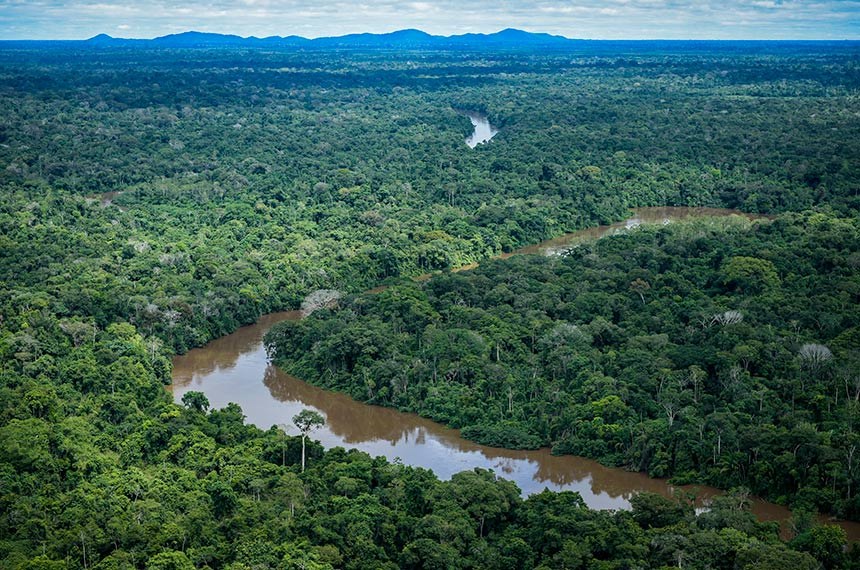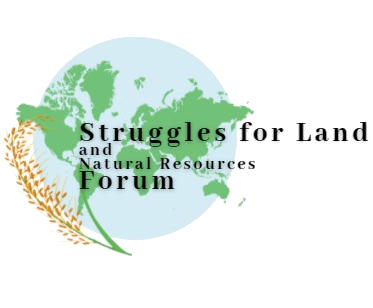
Theme 4: Occupation of territories by foreign companies: impacts on local populations
Discussion 4 was opened on January 31, 2023 with a series of presentations by unions, NGOs, experts and community members on the role of foreign firms and the effects of financialization in Brazil and the world. It concluded on March 7 with an assessment of the exchanges, particularly those held during the regional webinars in Brazil and Europe on February 23, to point out avenues of action that open a new phase of work for the FLT.
Find here the full recordings of these webinars, the presentation materials of the speakers, the exchanges on the discussion forum of this discussion

There is no need to register. The videoconferences are simultaneously translated into 4 languages: French/English/Spanish and Portuguese.
Theme 4, from January 31 to March 7, 2023
Debates about land grabs by foreign companies in Brazil have increased in recent years. These land grabs have an impact on food sovereignty, the environment and the security and rights of peasant, forest and fishing populations.
In order to feed the profits of large national and/or international companies, they do not hesitate to commit fraud in order to grab public land, most often with the connivance of local private or public actors. Land grabbing and concentration lead to overexploitation of natural resources, agrarian conflicts and forced population displacement.
According to official government data (IBGE/2017), the structure of land ownership in Brazil remains concentrated. According to the data, the country has 5,073,324 agricultural establishments. Of these establishments, 51,203 have an area greater than 1,000 hectares, which represents only 1% of the total number of establishments, but occupies 47% of the land used by agricultural establishments; the remaining 99% of establishments occupy 53% of agricultural land. In all, family farming, with its more than 10 million workers, has only 23% of the agricultural land.
According to data from INCRA (Brazil's land agency), in 2020 about 3.9 million hectares of land are registered in the country as foreign property, of which 2.2 million were acquired by individuals and 1.7 million are controlled by companies. Of note is the purchase of 750,000 hectares by the Harvard University Fund and TIAA-CREF (a US insurance and investment fund company), through fraud or legal trickery using the names of Brazilian companies, verified by INCRA in 2020.
According to an article published by the newspaper Brasil de Fato, foreign-controlled land in Brazil is distributed as follows: 33% in the Southeast region, 22% in the Midwest region, 16% in the Northeast region, 15% in the South region and 14% in the North region.
In 2020, Brazil recorded records in terms of environmental devastation, fires and a significant advance in the destruction of protected areas. More than 3.4 thousand Km² of Amazonian forest disappeared during the second half of the year in 2020 (DETER/INPE, 2020). Approximately 1,576 cases of land conflicts, affecting more than 171,000 Brazilian families, were registered in the same year (CPT, 2021).
Also in 2020, the federal Senate approved bill 2.963/2019 - currently under discussion in the House of Representatives -, which relaxes rules and reduces restrictions and allows foreigners to buy up to 25% of the territory of Brazilian municipalities. The argument used to justify this law is to attract foreign investment to the country. If this law were to be passed, it would pose a direct threat to the national sovereignty and security of family farmers, peasants, indigenous, quilombola and traditional populations in Brazil, leading to a significant increase in food insecurity, inequality and conflicts already existing in rural areas.
CONTAG and its partner social movements have carried out a series of actions at national and local level, denouncing and liaising with social and parliamentary organisations in order to define strategies for fighting and combating the occupation of national territory and the violation of the rights of rural, forest and aquatic populations by foreign companies.
The 4th round of the Global Forum of Struggles for Land and Natural Resources, coordinated by CONTAG, aims to inform and report on the reality in Brazil. This discussion will allow an exchange between organisations from different regions and continents in order to propose strategies to fight against the expansion of foreign companies and international capital.

Hello, today I am seized by a citizen platform grouping cooperatives and civil society organizations, which was formed around the city of Moundou in southern Chad. They want to denounce the actions concerning the alert that they launched on January 04, 2023 on land grabbing, the defense of national interests and on the violations of the National sovereignty of Chad. The facts are happening in the Western Logone province around the new slaughterhouse in the city of Moundou and the creation of a special economic zone (SEZ). The Chadian state is associated in PPP... Lire la suite "
Corrected message Hello to everyone. Congratulations on the resumption of the Forum discussions. The title and the introductory text of the fourth discussion topic make me wonder about several things, which I would like to submit to the speakers at the launch conference on January 31, 2023. How does the impact of land use by foreign actors differ from land use by domestic actors? This question overlaps with two other more specific questions, depending on the sectors involved, rural populations on the one hand, and the total population (urban and rural) on the other. What is the impact of Brazilian... Read more "
Mensaje corregido Hola a todos. Enhorabuena por la reanudación de los debates en el Foro. The title and the introductory text of the fourth topic of debate make me wonder about several things that I would like to ask the participants of the inaugural conference on 31 January 2023. ¿En qué se diferencian las repercusiones del uso de la tierra por parte de agentes extranjeros del uso de la tierra por parte de agentes nacionales? In realidad, esta pregunta se solapa con otras dos más específicas, según los sectores de que se trate, las poblaciones rurales, por una parte, y la... Read more "
Mensagem corrigida Olá a todos vocês. Parabéns pela retomada das discussões do Fórum. O título e o texto introdutório do quarto tema de discussão me fazem pensar em várias coisas, que eu gostaria de colocar aos palestrantes da conferência de lançamento em 31 de janeiro de 2023. Como o impacto da ocupação dos territorios por atores estrangeiros difere da ocupação dos territorios por atores nacionais? Esta questão na verdade se sobrepõe a duas outras questões mais específicas, dependendo dos setores envolvidos, as populações rurais, por um lado, e a população total (urbana e rural), por outro. Qual é o impacto... Lire la suite "
The automatic translation of my previous message contained several errors or misunderstandings in Portuguese, Spanish and English. I therefore invite you to read the revised translations in each of these languages in my following messages. Thank you.
Hello to everyone. Congratulations on the resumption of the Forum discussions. The title and introductory text of the fourth discussion topic makes me wonder about several questions, which I would like to submit to the speakers at the January 31, 2023 launch conference. How does the impact of land tenure by foreign actors differ from land tenure by domestic actors? This question actually overlaps with two other more specific questions, depending on the sectors involved, rural populations on the one hand, and the total population (urban and rural) on the other. What... Read More "
In Cameroon, and more precisely in the Minta Communal Forest in the Centre Region, this forest is located in a transitional forest-savanna zone, in an advanced state of degradation due to logging activities and the development of industrial-scale agriculture within this landscape. These activities have been instrumental in advancing the degradation front of this forest to the benefit of the increase of savanna surfaces. By initiating reforestation activities on this site, with the financial support of donors, the communities would like to participate in the reversal of... Read more "
In France, the SAFER (Sté pour l'Aménagement Foncier et l'Etablissement Rural) is supposed to monitor land transfers. However, it is becoming apparent that company set-ups can escape control and that operations sometimes slip under its radar. The recent "Sempastou" law promises to limit the phenomenon but too many exemptions will limit its effectiveness. The strong pressure on agricultural land due to the development of "agri-voltaics" and energy crops (methanisation, diesther) are driving up prices and driving away the holders of nourishing agricultural projects from the land, a land law is urgent. The case in point in France is the purchase of... Read more "
This phenomenon is beginning to grow in the Central African Republic as a result of armed conflicts and the massive arrival of international forces who are becoming investors...
Hello Ngakeu, and thank you for your participation. Could you share with us one or more examples of land occupation in the Central African Republic? Do you have any examples of local struggles to reclaim this land? Thank you very much!
Do you think that this discussion will result in a mouse or an elephant in the lives of local people, especially in the tropical zone?
Very good initiative in any case... !!!!!!!
Very interesting in solidarity fassery Traoré